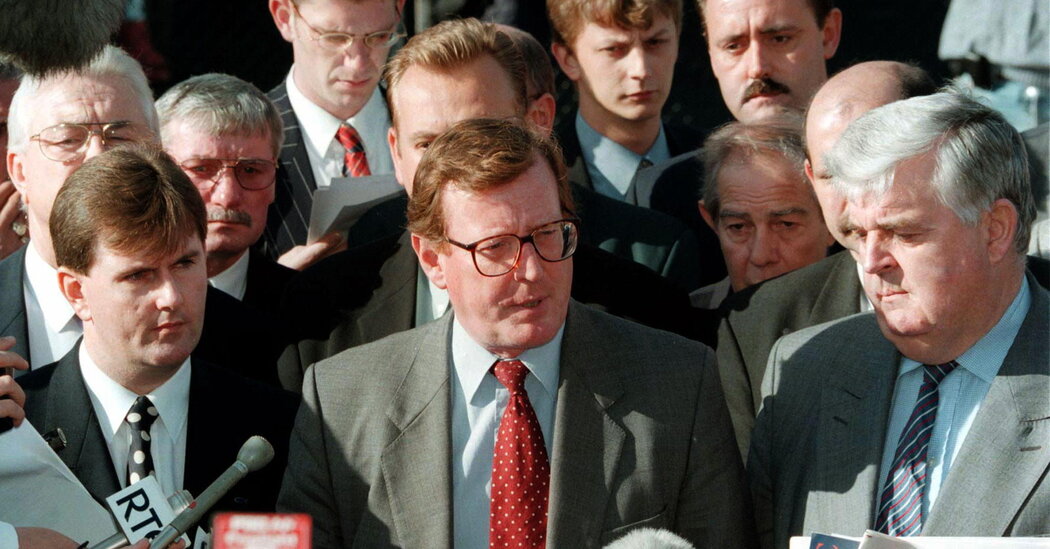
LONDON — David Trimble, a onetime Protestant firebrand who surprised many by reaching across the bloodstained sectarian divide in his native Northern Ireland and went on to secure high office, political honors and a Nobel Peace Prize, died on Monday. He was 77.
His death was announced by the Ulster Unionist Party, which he led. A party statement, on behalf of the Trimble family, did not specify where he died or give the cause, saying only that his death came after “a short illness.”
Mr. Trimble shared the prize with John Hume, a Roman Catholic onetime adversary, after the two men played big parts in the American-brokered negotiations that led to the so-called Good Friday agreement in 1998, formally ending three decades of strife known as The Troubles that had claimed more than 3,000 lives.
“Trimble, more than any other unionist, is responsible for putting an end to the bloodshed that had convulsed Northern Ireland for 30 years,” The New York Times said in an editorial in May 2005.
He went on to become first minister of Northern Ireland in a regional assembly that was set up under the Good Friday pact but that was rived by dispute, often over the actions of the clandestine Irish Republican Army, which had fought for decades against both the British Army and Protestant paramilitaries.
Mr. Trimble’s political beliefs were rooted in the unionist desire for close ties between Northern Ireland and the rest of Britain. By contrast, his adversaries in the I.R.A., its political wing, Sinn Fein, and other Catholic groups strove for a united Ireland. The rival visions of the future were inspired and deepened by enduring antagonisms and visceral distinctions of faith and ideology.
Such were Mr. Trimble’s ties to Britain that, when he resigned as first minister in 2005 after losing his seat in the British House of Commons, the lower house, he became a peer in the upper House of Lords, assuming the title of Baron Trimble of Lisnagarvey in the County of Antrim. He joined Britain’s Conservative Party.
For much of his life, Mr. Trimble pursued twin-track careers in academia and politics, practicing and teaching law at Queen’s University in Belfast.
Some analysts depicted him as a shy, reclusive figure, most at home in his study listening to opera by Strauss, Verdi and Wagner. Critics said he could seem aloof, awkward and tetchy, even irascible, with what The Times editorial called an “unappealing personality.” But he preferred to depict himself more as a pragmatist, albeit one with a dry wit.
“I am personally and perhaps culturally conditioned to be skeptical of speeches which are full of sound and fury, idealistic in intention but impossible of implementation; and I resist the kind of rhetoric which substitutes vapor for vision,” he said in his Nobel Prize acceptance lecture in December 1998.
He added, “Instinctively I identify with the person who said that when he heard a politician talk of his vision, he recommended him to consult an optician.”
But, particularly in his earlier years, he was no stranger to the theatrical politics of gesture and defiance.
In 1995, for instance, as a member of both the British Parliament and the hard-line Vanguard movement, he joined hands with the Rev. Ian Paisley, a fire-breathing anti-Catholic Protestant cleric, at the head of a group of Orange Order Protestants marching through a Catholic neighborhood in Portadown, west of Belfast. Afterward he danced a jig of triumph with Mr. Paisley to celebrate running this particular gauntlet.
Yet in 1998 he met face-to-face with Gerry Adams, the former leader of Sinn Fein, in what would have once been an unthinkable and perilous encounter for a unionist leader.
“He has taken a political chance in identifying himself with the process,” said Francis Sejersted, the chairman of the secretive Norwegian committee that awards the peace prize. The Nobel citation in 1998 said Mr. Trimble had displayed “great political courage when, at a critical stage in the process, he advocated solutions which led to the peace agreement.”
The Nobel committee said it hoped that the Good Friday agreement would “inspire peaceful solutions to other religious, ethnic and national conflicts around the world.”
But in his Nobel lecture, Mr. Trimble seemed to distance himself from that hope, vouchsafing “some fairly serious reservations about the merits of using any conflict, not least Northern Ireland, as a model for the study, never mind the solution, of other conflicts.”
“I believe that a sense of the unique, specific and concrete circumstances of any situation is the first indispensable step to solving the problems posed by that situation,” he said.
William David Trimble was born on Oct. 15, 1944, in Belfast, the son of William and Ivy (Jack) Trimble. His father was “a middle-ranking official in the Ministry of Labor,” while his mother was a clerk and typist in the same department, according to a 2005 biography of Mr. Trimble, “Himself Alone.” He was the second of three children.
As Presbyterians, the Trimble ancestors were a “minority within a minority” of Protestants in Ireland before the partition and the creation of Northern Ireland as a Protestant-dominated enclave in 1921.
He grew up in Bangor, Northern Ireland, a resort and commuter town east of Belfast, and attended school there before starting work as a civil servant at Northern Ireland’s Land Registry. He studied law at Queen’s University in Belfast and won a rare first-class honors degree, enabling him to become an assistant lecturer there in property law.
His first marriage, in 1968, was to Heather McComb, who had also worked at the Land Registry. The couple lost twin sons at birth. They divorced in 1976. Two years later, Mr. Trimble married Daphne Elizabeth Orr, and they had four children — Richard, Victoria, Nicholas and Sarah. His wife and children survive him, British news outlets said.
Drawn increasingly to politics, Mr. Trimble held a variety of positions in the 1970s and was linked initially to the right-wing Vanguard Unionist Progressive Party, a radical movement linked to a paramilitary group. He actively opposed a previous peace settlement, the short-lived Sunningdale Agreement, which was signed in 1973 and collapsed in 1974.
Mr. Trimble’s rise to political power coincided with a time of turmoil and bloodletting. The Troubles took root in the late 1960s. In response, Britain deployed troops and in 1972 reasserted direct rule in Northern Ireland. By that time, more than 300 people had died in the unrest.
“I would personally draw the line at violence and terrorism, but if we are talking about a campaign that involves demonstrations and so on, then a certain amount of violence may be inescapable,” Mr. Trimble said at the time.
In 1978, when the Vanguard movement disbanded, he joined the mainstream Ulster Unionist Party. In 1990, he was elected to the British Parliament in a by-election and resigned from Queen’s University to pursue his political career.
Five years later, just after his parade with the Mr. Paisley in Portadown, Mr. Trimble surprised many analysts when he was elected party leader. Almost immediately he signaled a readiness for communal rapprochement, breaking with decades of antagonism and, courting the ire of unionist hard-liners, meeting with Roman Catholic political figures.
As the talks that would eventually lead to the Good Friday agreement got underway, Mr. Trimble fought hard to ensure that unionists would maintain a potential veto in return for sharing power with nationalists.
Under the terms of the agreement, Mr. Trimble became Northern Ireland’s first minister, but his years in office were marked by disputes that provoked suspensions of a power-sharing assembly set to run much of Northern Ireland’s government.
He went so far as to resign in July 2001 to protest what he termed intransigence by the I.R.A. in disarming. But he was voted back into office that November.
In 2005, as opinion shifted in Northern Ireland, he lost his parliamentary seat and later resigned from his party’s leadership. He was ennobled as a British peer the following year.
His voice continued to resonate, though less frequently. In the prelude to Britain’s departure from the European Union in 2019, he supported Brexit but took issue with the Northern Ireland protocol, an addition to the deal that placed Northern Ireland in an ambiguous place between European Union and British jurisdiction.
“I personally feel betrayed by this,” Mr. Trimble wrote in The Irish Times. “I made huge personal and political sacrifices to persuade the people of Northern Ireland’’ of the benefits of the 1998 agreement.
And he added: “Not only do I personally feel betrayed, but the majority unionist population in Northern Ireland feels betrayed too.”




